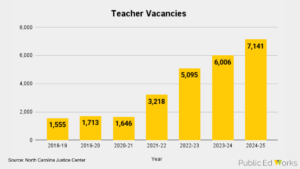CLICK HERE TO READ THE FULL SERIES: Lessons Learned Series
Lessons Learned: Why don’t we invest in our children?
RALEIGH (August 14, 2025) – As students head back to the classroom, we’re diving deeper into the struggles educators are dealing with in our state.
Over the next several weeks, we will publish a series of articles to address how legislative actions – and inaction – in North Carolina over the past few decades have contributed to harm in our public schools.
Lessons Learned: NC teacher pay falls to bottom of rankings
RALEIGH (August 20, 2025) – It’s no secret that pay is a concern for North Carolina teachers – the latest report from the National Education Association ranks the state 43rd in the U.S. for average teacher salaries.
It hasn’t always been this way. Based on a table from the American Federation of Teachers, 25 years ago the average teacher salary in 1999-2000 in North Carolina was $39,404, which ranked 22nd in the nation.
Lessons learned: Voucher expansion and public schools
RALEIGH (August 28, 2025) – North Carolina has seen a vast expansion of vouchers – taxpayer dollars for students to attend private schools – called “Opportunity Scholarships.”
The state is projected to spend $731 million on its voucher programs this year, according to the NC General Assembly’s Fiscal Research Division.
Heather Koons, Communications and Research Director with Public Schools First NC, said all of this is happening while public schools suffer.
Lessons Learned: Spending per student among lowest in nation
RALEIGH (September 4, 2025) – Lack of funding is the root of many issues facing North Carolina public schools today, as legislators have failed to allocate enough funds to keep up with surrounding states, setting our state behind.
GDP, or Gross Domestic Product, is the value of goods and services produced in a state. In 2024, North Carolina dedicated just 2.4 percent of its GDP to spending on public schools, putting our funding effort below every state except for Arizona.
We ranked 49th.
Lessons Learned: NC leaves young learners behind
RALEIGH (September 10, 2025) – Legislators’ refusal to properly fund education even affects our youngest learners in North Carolina.
Research shows pre-kindergarten can be a crucial stage to a child’s development. North Carolina has a high-quality Pre-K program, but the state isn’t serving all the kids it can.
Last year, NC Pre-K enrolled 27,928 children, only 57% of about 49,000 four-year-olds from lower-income families who were eligible.
Lessons Learned: NC struggles to recruit and retain teachers
RALEIGH (September 17, 2025) – Thousands of teachers leave North Carolina classrooms every year – and legislators ignoring the needs of educators could be to blame.
Low pay and lack of respect, among other problems, are cited as reasons why school districts have trouble filling teaching positions.
The latest attrition rate, or what percentage of teachers left their jobs in a public school, was 9.88% for 2023-24.
Unfilled positions have grown each year, according to the NC Department of Public Instruction.
Lessons Learned: Troubling tax cuts harm public schools
(RALEIGH) – While North Carolina school systems are grappling with underfunding, corporations and millionaires are paying less and less taxes.
Corporate tax rates were reduced from a 6.9% rate in 2012 to 2.3% and are planned to drop to 0% by 2030. In the year 2000, the rate was 7%.
Funds from corporate taxes flow into the N.C. General Fund and are spent on public services, the largest one being public education.
Lessons Learned: Fully funding public schools is the answer
RALEIGH (October 2, 2025) – Over the past several weeks we’ve looked at a range of issues in North Carolina’s public schools, but one theme stands true throughout – most problems stem from a lack of funding.
Low teacher pay
Low pay is a major concern for North Carolina teachers. The latest report from the National Education Association ranks the state 43rd in the U.S. for average teacher pay.
Just 25 years ago, North Carolina was ranked 22nd in the nation, based on a table by the American Federation of Teachers.
As inflation hits all Americans hard, teacher salaries haven’t kept up with the cost of living.
It drives potential and current teachers away from the profession, or causes them to cross state lines for better pay.


